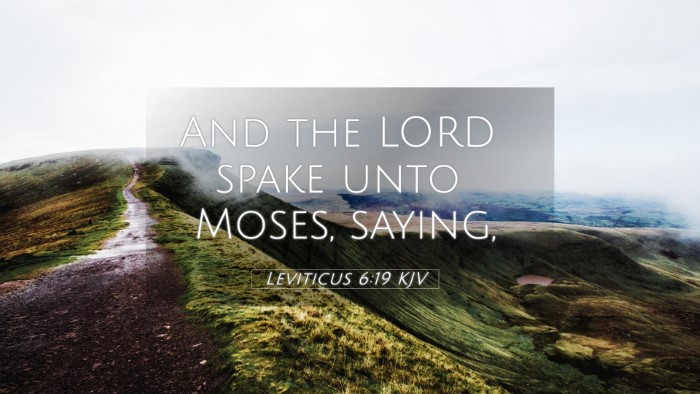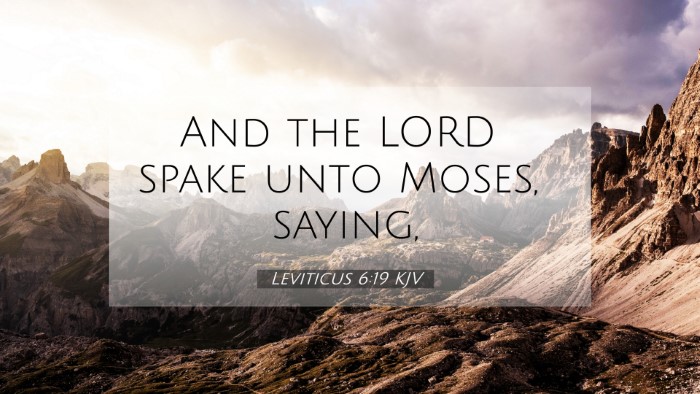Understanding Leviticus 6:19
Verse: "And this is the law of the meat offering: the sons of Aaron shall offer it before the LORD, before the altar." (Leviticus 6:19)
Overview: This verse serves as a part of the detailed regulations concerning offerings, specifically the meat offering (or grain offering) prescribed for the priests. Its significance lies in the dedication of food to God and the role of the priests in carrying out these offerings.
Commentary Insights
Matthew Henry Commentary
Matthew Henry emphasizes that the meat offering showcases the necessity of presenting what is valuable to God. It illustrates a deeper spiritual truth—worship involves both substance and intention. Here, the act of the sons of Aaron offering this before the Lord means that they are acknowledging God’s sovereignty and provision.
Albert Barnes Commentary
Albert Barnes highlights the ceremonial aspects of this offering. He notes that the meat offering was meant to be a token of gratitude to God for the blessings received. The specificity of the requirement for Aaron's sons to perform this rite indicates that the priestly line had a unique responsibility for worship and atonement in Israel.
Adam Clarke Commentary
Adam Clarke reflects on the significance of the meat offering. He explains that it symbolizes a heart inclined towards God. The law given here not only instructs the priests in their duties but also serves as a reminder to all Israelites about the imperative of offering the best to God as an act of worship and submission.
Connections Between Bible Verses
Leviticus 6:19 resonates with various themes throughout the Bible. Here are significant cross-references that deepen our understanding:
- Exodus 29:34: Connections with the consecration of priests highlight the ongoing need for proper offerings.
- Leviticus 2:1: Discusses the nature of the meat offering and further emphasizes its importance.
- Numbers 28:2: Reinforces the continual offering of sacrifices to God as a vital part of worship.
- Hebrews 10:10: Ties the old sacrificial system to the final sacrifice of Christ, indicating a transition in how offerings are viewed.
- 1 Peter 2:5: Relates the believers as a holy priesthood, paralleling the role of Aaron’s sons in presenting offerings.
- Malachi 1:11: Addresses the attitude of offerings, underscoring the need for sincere worship.
- Romans 12:1: Encourages believers to present their bodies as living sacrifices, thus reinterpreting the concept of offerings in a Christian context.
Thematic Bible Verse Connections
The themes in Leviticus 6:19—obedience, worship, and the priesthood—find parallels and elaboration throughout the scripture:
- Obedience to God's Commands: Deuteronomy 5:33 emphasizes the need to walk in God’s ways.
- The Role of Worship: Psalms 119:108 showcases the importance of God’s ordinances in worship.
- Human Sacrifice and Divine Acceptance: John 4:24 highlights that true worship requires spirit and truth.
- Generosity as an Offering: 2 Corinthians 9:7 illustrates the principle of heartfelt giving as an offering before God.
Scriptural Cross-Referencing
Cross-referencing biblical texts allows for a rich understanding of themes and motifs in scripture. By exploring connections between Leviticus 6:19 and other verses, one can discern the importance of offering in both the Old and New Testaments.
Using tools for Bible cross-referencing can enhance our study and application of scripture. A Bible concordance is an excellent resource for identifying keywords that indicate thematic links.
Conclusion
Leviticus 6:19 is a crucial verse for understanding the nature of offerings in the context of worship. It not only instructs the priests on their duties but also communicates significant spiritual truths regarding the nature of our relationships with God. By engaging in comparative Bible verse analysis, we can deepen our appreciation for the continuity of God's covenant throughout the Bible.


